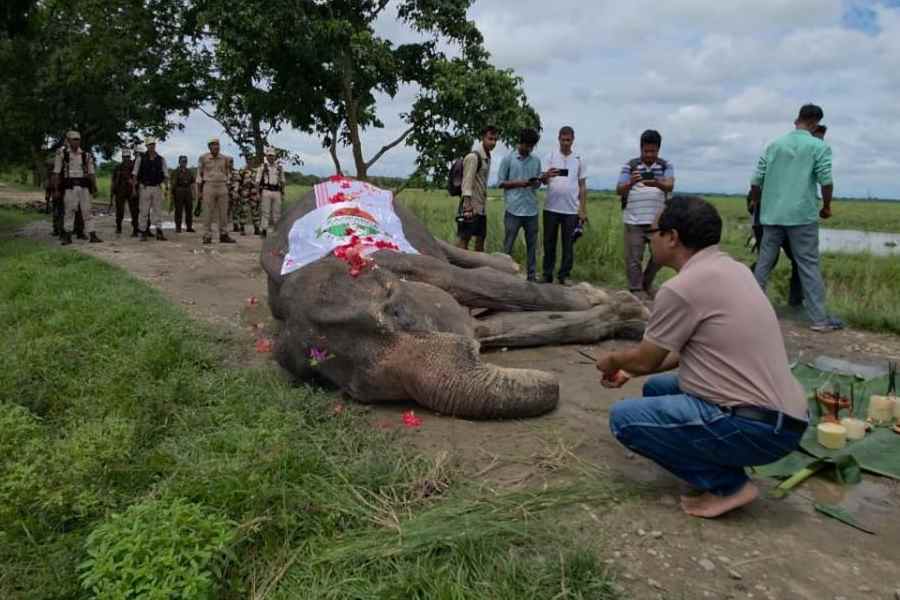The Kaziranga National Park (KNP) authorities on Thursday mourned the passing of Mohanmala — one of its oldest, most iconic elephants — describing her as a “trusted colleague, flood-time saviour and symbol of loyalty and courage” whose decades of service “will remain etched in the park’s history”.
Mohanmala died on Thursday morning at an estimated age of 85, leaving behind a legacy spanning over five decades of dedicated service. The park shared videos of her life, organised a funeral ceremony at Mihirmukh and performed her last rites with staff and officials in attendance — gestures reflecting the deep bond between the “gentle giant” and those who worked alongside her. Forest officials continued reiterating how important the tusker’s services were.
Fearless beast
Kaziranga National Park and Tiger Reserve director Sonali Ghosh said the world heritage site was mourning “one of the park’s oldest inmates” whose contribution during floods and anti-poaching operations was invaluable.
“Over the past five decades, she served the park with exceptional dedication, becoming an inseparable part of Kaziranga’s conservation history. Mohanmala retired from active departmental duties in 2003, having reached the age of 60,” Ghosh said.
The park currently has 67 departmental elephants for various operations, with only two retired — Mohanmala among them.
Known for her fearlessness, obedience and docile temperament, she was also an exceptional swimmer. In flood seasons, when forest staff could not reach their camps by boat, Mohanmala carried them on her back to ensure essential duties were never disrupted.
She also played an active role in anti-poaching operations, fearlessly aiding staff in challenging terrains. She was brought to Kaziranga on May 17, 1970, procured from Kamrup during the tenure of the then principal chief conservator of forests (PCCF), late Durga Prasad Neog.
During her service, she gave birth to two female calves — Malati, who died at 17, and another calf killed by a tiger just three days after birth.
Mahout memory
Her head mahout, Kiran Rabha, recalled a chilling encounter that captured Mohanmala’s bravery and instinct to protect.
One winter morning, while patrolling near Mihibeel wetland, Rabha was riding Mohanmala alongside her calf Malati when a wild bull elephant suddenly charged. Trumpeting loudly, the bull uprooted a large tree in aggression.
Sensing danger, Mohanmala turned towards the deep waters of Mihibeel — a terrain she knew well — and plunged in, urging Malati to follow. With powerful strokes, she ferried Rabha across the wetland to safety.
Only after reaching the far bank and ensuring her mahout’s safety did she vanish into the forest with her calf. For weeks, she remained missing, returning calmly to camp about a month later — a testament to her resilience and the unspoken bond between elephant and human.
Conservation success
Kaziranga, famed for its one-horned rhinos, is also home to over 1,200 elephants, 148 tigers, more than 5,000 deer and 48 grassland bird species. The park’s expansion and enhanced protection — with active involvement of local communities — have made it a global conservation success story.
In this landscape, elephants like Mohanmala have been vital, not just as work animals, but as partners in conservation. Their ability to navigate difficult terrain, respond to their mahouts’ instructions and assist in flood rescues makes them indispensable.
For those who knew Mohanmala, her passing marks the end of an era. “She was more than an elephant — she was a colleague, a protector, and a friend,” one forest guard said. “Kaziranga will not be the same without her.”










